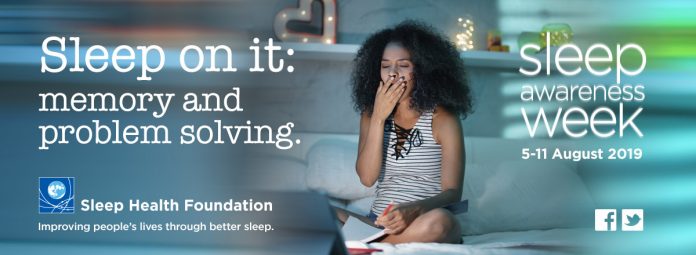Your memory not what it used to be? Australians are quick to blame their forgetfulness on ageing when the real reason is closer to home, sleep experts warn.
Specialists at the Sleep Health Foundation are raising concerns many adults don’t understand just how much their sleep is affecting their daytime functioning, particularly their memory and their mood.
“It’s very common to hear people pass off their forgetfulness and their fogginess as the result of getting old,” says Sleep Health Foundation Chair, Professor Dorothy Bruck. “What many fail to recognise is that sleep – or lack of it – is playing a pivotal role in memory and mood. Age is a factor too, but improve your sleep and you’ll be surprised at the brain boost that follows.”
Research shows four out of 10 Australians get insufficient sleep either daily or several days a week. Lack of shut-eye is known to affect mood, energy levels, productivity, weight and the likelihood that you may develop serious health conditions like diabetes, heart disease and hypertension.
The national sleep authority is using this week’s Sleep Awareness Week to draw attention to the conclusive link between sleep and memory. Multiple studies have confirmed sleep helps learning and memory in two distinct ways. “Firstly, sleep helps to prepare our brain for learning new things,” Prof Bruck explains. When we are well rested we can pay better attention to new information that we come across in our daily experiences.
Secondly, sleep helps make new information ‘stick’. “During sleep, the brain replays memories from the day, making the neural connections stronger,” the sleep psychologist says. “This process of memory consolidations is essential to remember the things we experienced when we were awake.”
Sleep also plays an important role in creativity, helping us find new solutions to problems by looking at things in a new way while we sleep. “You may have heard people say they will ‘sleep on it’ in order to solve a problem or make a decision,” Professor Bruck says. “The process of sleep will often enable a better solution.
Guidelines recommend adults get seven to eight hours sleep a night, however many try to survive on considerably less. The Sleep Health Foundation says the nightly snooze dose can be increased with a quiet room, a relaxed mind and a comfortable bed. It advises people avoid caffeine after 2pm, start winding down an hour before bed and keep technology out of the bedroom.
“You’d be surprised how many people ignore these important guidelines and snuggle up with their iPhone in their overheated bedroom after drinking too many glasses of wine,” Professor Bruck says.
Sleep Awareness Week runs from 5 – 11 August, 2019, and focuses on the benefits of sleep for optimal cognitive functioning from infancy to old age.
- The link between dementia and sleep. How altered brain activity during sleep may be a risk factors for cognitive impairment and neurodegeneration
- Obstructive sleep apnea and improvements to cognition when treated
- How sleep can help recovery from brain injury
- Importance of sleep for attention, learning and memory at all ages
About Sleep Health Foundation
The Sleep Health Foundation is Australia’s leading advocate for sleep health. The Foundation aims to improve people’s sleep and their lives by promoting healthy sleep, raising awareness of sleep disorders and building partnerships with organisations. Free, independent, expert-written fact sheets on every aspect of sleep are available at www.sleephealthfoundation.org.au




























